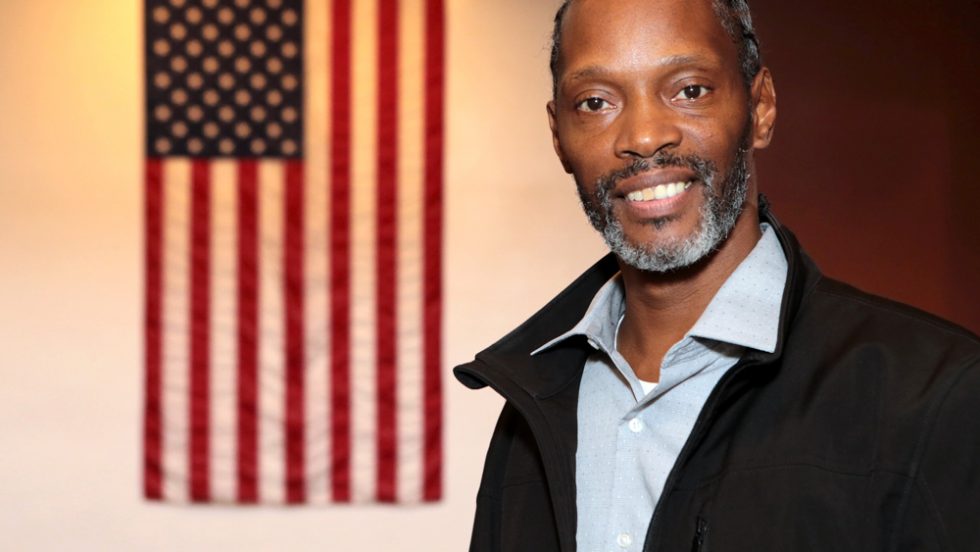
Brent Russell returned to Adelphi to tell stories about veterans—his own and those of the clients he now serves as program coordinator for the Veterans Health Alliance of Long Island.
The first client was a survivor who had served both in the military and with the New York City Fire Department. It was in the latter position that he was a first responder after the 9/11 attacks on New York City. He had seen horrible things, but he pulled himself through—except for every September, when he would drink himself into a stupor.
Another war veteran claimed to be okay with his experiences on the front until he took his young son to see the film Iron Man and it all came back to him in a paralyzing panic attack.
Both of these men needed help, even though it took them time to admit it, and both of them were able to find help through the peer counseling provided by the Veterans Health Alliance of Long Island.
Russell told these stories about surviving the military and reentering civilian life at a talk he gave at the Ruth S. Harley University Center on November 5, 2018. He also told his own story—how a military career cut short led him back to school and into supporting veterans returning home.
Russell joined the army at age 23, shortly before the United States entered into the Gulf War and at a low point in his own life. “I didn’t feel too good about myself,” he said. “I had some issues with self-love and self-respect. I felt like if I joined the military, I would immediately feel good about myself. I’d be serving my country. I’d be protecting civilians. And that’s exactly what happened.”
At least at first. Russell injured his knee in training, shortly before being shipped off to the Middle East. He received medical treatment but still didn’t feel able to perform at his best. He was told he’d be sent anyway, and it wasn’t until former U.S. Rep. Floyd Flake intervened (after being contacted by Russell’s grandmother) that Russell was spared a risky assignment. He was, however, put on a mundane data entry job until being discharged.
“I didn’t know what I was doing,” Russell said. “I was back to this self-respect issue. I wanted to fight for my country. I wanted to be that soldier. All those feelings came back.”
Those feelings are something Russell now refers to as “survivor’s guilt,” a feeling that by getting out of the military alive, he’d let his comrades down. He worked a few jobs, searching for direction, before deciding it was time to go back to school and enrolling in Adelphi’s School of Social Work.
“When you’re in the military, you have power,” he said. “You’re the protector of the nation. You have an M16. You have a license. There’s a sense of power and authority that you feel. What do you do with that when you go home? It’s almost like you have to detox.”
There’s also, he said, the loss of camaraderie, something that peer counseling can help to replace. It can be as simple as going to a basketball game together—another part of the Veterans Health Alliance’s activities. They’ll be bringing a group to see the Long Island Nets play at the Nassau Veterans Memorial Coliseum—on the afternoon of Veterans Day, in fact.
“A lot of us come home and we’re okay,” Russell said. “Some of us come home and we’re not okay, and we need help.”
Support and camaraderie are available to vets on Adelphi’s campus as well. Kappa Sigma is hosting its first Veterans Day Gala this year on Monday, November 12, with guest speakers and a station set up for sending cards to vets. A $5 entry fee will raise funds for the philanthropy Military Heroes.
It’s that kind of event that reinforces how veterans are a part of the Adelphi community, a notion underscored by Vice President for Diversity and Inclusion Perry Greene, Ph.D.
“Providing a welcome and inclusive community for our veterans is key for Adelphi to truly become a model of diversity and inclusion,” Dr. Greene said. “Student veterans are not an addition to our community. They are part of the fabric of our community.”